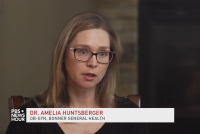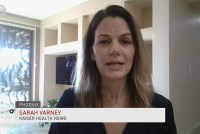Latest KFF Health News Stories
Domestic Violence Shelters Move Out of Hiding
A new domestic violence shelter in Bozeman, Montana, reflects efforts nationwide to rethink the model that keeps survivors of abuse in hiding. But there are no guidelines for bringing shelters out into the open, leaving each to make it up as they go.
Watch: 5th Circuit Judges Question Two-Decade-Old Approval of Abortion Pill
The 5th Circuit Court of Appeals in New Orleans heard oral arguments Wednesday in a case brought by conservative Christian abortion opponents seeking to revoke FDA approval of mifepristone, a medication used in more than half of abortions in the U.S.
New Mexico Program to Reduce Maternity Care Deserts in Rural Areas Fights for Survival
A federally funded program in remote New Mexico has helped hundreds of pregnant mothers stay healthy, but it’s running out of time and money despite a growing national maternity care crisis. The four-year, nearly $3 million grant has provided telehealth, coordinated care, and social services to mothers in need.
In Idaho, Taking a Minor Out of State for an Abortion Is Now a Crime: ‘Abortion Trafficking’
Under the nation’s first law of its kind, teens must have parental consent to travel for medical care, including in cases of sexual assault or rape. Any adult, including an aunt, grandparent, or sibling, convicted of violating the criminal statute faces up to five years in prison — and could be sued for financial damages.
Can a Fetus Be an Employee? States Are Testing the Boundaries of Personhood After ‘Dobbs’
Laws granting rights to unborn children have spread in the decades since the U.S. and Missouri supreme courts allowed Missouri’s definition of life as beginning at conception to stand. Now, a wrongful death lawsuit involving a workplace accident shows how sprawling those laws — often intended to curb abortion — have become.
Montana Passes Significant Health Policy Changes in Controversial Session
The recently ended legislative session was marked by Medicaid reimbursement hikes, abortion restrictions, anti-LGBTQ+ statutes, behavioral health spending, and workforce and insurance measures.
Federal Rules Don’t Require Period Product Ingredients on Packaging Labels. States Are Stepping In.
New York and California have passed laws requiring disclosure of ingredients on menstrual product packaging. Advocates want more transparency across the U.S.
After Idaho’s Strict Abortion Ban, OB-GYNs Stage a Quick Exodus
At least two Idaho hospitals are ending labor and delivery services, with one citing the state’s “legal and political climate” and noting that “recruiting replacements will be extraordinarily difficult” as doctors leave.
Doctors’ Lesson for Drug Industry: Abortion Wars Are Dangerous to Ignore
The American Medical Association ducked the abortion issue for years and now sees its members’ professional opinions second-guessed by lawmakers and judges. PhRMA is following the same playbook.
Watch: Rulings on Abortion Pill Have Far-Reaching Repercussions
Sarah Varney, a senior correspondent for KHN, joins Ali Rogin of PBS NewsHour to discuss the ruling by a federal judge in Texas that threatens nationwide access to the widely used abortion drug mifepristone, and a separate ruling in Washington state that reached the opposite conclusion.
Abortion Clinics in Conservative-Led States Face Increasing Legal Threats
Since the U.S. Supreme Court reversed federal protections for abortions, medical providers in conservative-led states have been fighting legal and political battles — as well as escalating threats from the anti-abortion movement.
What the Health? From KFF Health News: The Policy, and Politics, of Medicare Advantage
Medicare Advantage, the private plan alternative to traditional Medicare, is embroiled in a growing controversy over whether insurers are being overpaid and what it would mean to reduce those payments. Meanwhile, even as maternal mortality in the U.S. continues to rise, providers of care to pregnant women say they’re leaving states with abortion bans that prevent them from treating pregnancy complications. Margot Sanger-Katz of The New York Times, Jessie Hellmann of CQ Roll Call, and Joanne Kenen of the Johns Hopkins Bloomberg School of Public Health and Politico join KHN’s chief Washington correspondent Julie Rovner to discuss these issues and more.
Judge Signals He Could Rule to Halt Sales of Common Abortion Pill
A U.S. District Court case is being widely followed because the judge’s decision could overturn the FDA’s approval of mifepristone two decades ago. With abortion rights polling well even in red states, anti-abortion activists are increasingly turning to the courts to achieve their aims.
What the Health? From KFF Health News: Judging the Abortion Pill
Any day now a conservative federal judge in Texas could upend the national abortion debate by requiring the FDA to rescind its approval of mifepristone, a drug approved in the U.S. more than 20 years ago that is now used in more than half of abortions nationwide. Meanwhile, a controversial study on masks gets a clarification, although it may be too late to change the public impression of what it found. Alice Miranda Ollstein of Politico, Jessie Hellmann of CQ Roll Call, and Sarah Karlin-Smith of the Pink Sheet join KHN chief Washington correspondent Julie Rovner to discuss these issues and more. Plus, for “extra credit,” the panelists suggest health policy stories they read this week they think you should read, too.
The US Remains a Grim Leader in Preterm Births. Why? And Can We Fix It?
American women are more likely to deliver their babies prematurely than women in most developed countries. It’s a distinction that coincides with high rates of maternal and infant death, billions of dollars in costs, and even lifelong disabilities for the children who survive.
Girls in Texas Could Get Birth Control at Federal Clinics, Until a Christian Father Objected
A Donald Trump-appointed federal judge agreed that even the possibility that the father’s daughters might access contraception without his permission violated the tenants of his Christian faith.
Watch: Walgreens Won’t Sell Abortion Pill in 21 States Under GOP Threat of Legal Action
Under pressure from Republican attorneys general, the nation’s second-largest pharmacy chain says it will not dispense the abortion pill mifepristone.
One Texas Judge Will Decide Fate of Abortion Pill Used by Millions of American Women
“What happens in Texas doesn’t stay in Texas,” warns an abortion rights advocate bracing for a district judge’s ruling on whether the abortion pill mifepristone was properly authorized by the FDA. His decision could force the medication off the U.S. market.
What the Health? From KFF Health News: A Health-Heavy State of the Union
President Joe Biden’s 2023 State of the Union address leaned heavily on health care issues. Biden took a victory lap for recent accomplishments like capping prescription drug costs for seniors on Medicare. He also urged Congress to make permanent the boosted premium subsidies under the Affordable Care Act, and he sparred with Republicans on threats to cut Social Security and Medicare. Also this week, both sides in the abortion debate are bracing for a court decision out of Texas that could, at least temporarily, make the abortion pill mifepristone illegal nationwide. Alice Miranda Ollstein of Politico, Rachel Cohrs of Stat, and Sarah Karlin-Smith of the Pink Sheet join KHN chief Washington correspondent Julie Rovner to discuss these issues and more. Also this week, Rovner interviews Kate Baicker of the University of Chicago about a possible middle ground in the effort to get universal health insurance coverage.
What the Health? From KFF Health News: Au Revoir, Public Health Emergency
The Biden administration this week announced it would let the covid-19 public health emergency lapse on May 11, even as the Republican-led House was voting to immediately eliminate the special authorities of the so-called PHE. Meanwhile, anti-abortion forces are pressuring legislators to both tighten abortion restrictions and pay for every birth in the nation. Margot Sanger-Katz of The New York Times, Rachel Roubein of The Washington Post, and Victoria Knight of Axios join KHN’s chief Washington correspondent Julie Rovner to discuss these issues and more. Also this week, Rovner interviews Hannah Wesolowski of the National Alliance on Mental Illness about the rollout of the national 988 suicide prevention hotline.























